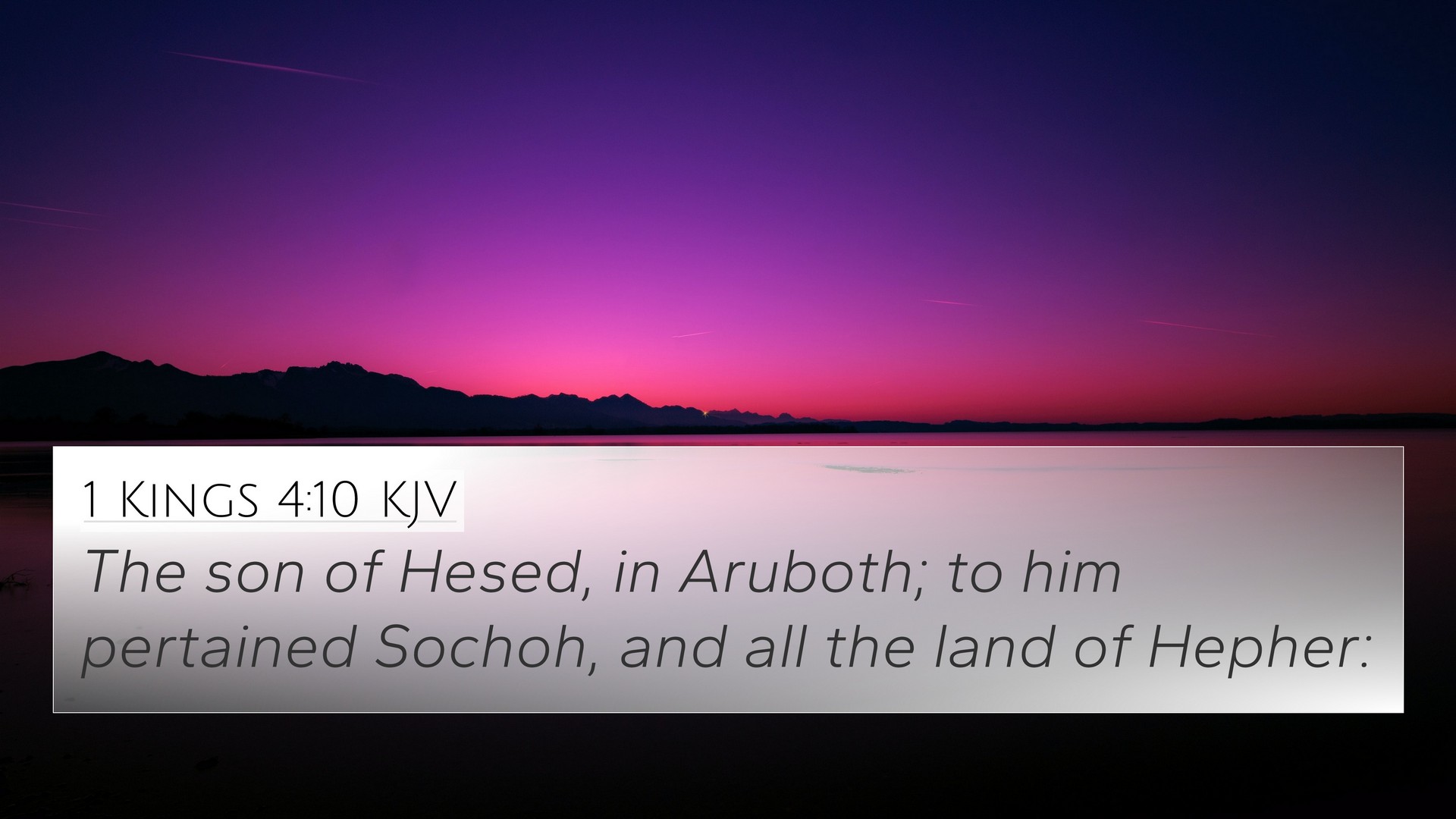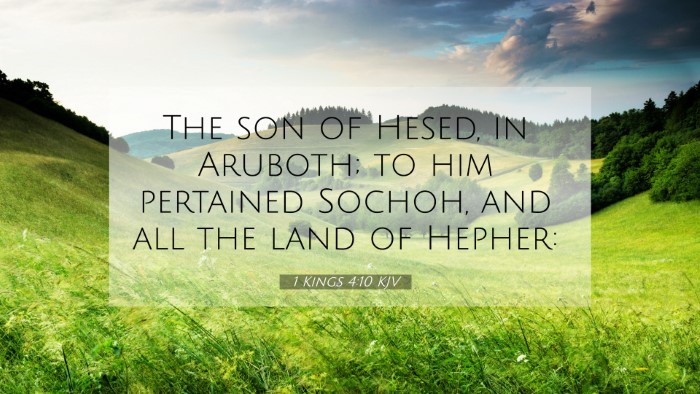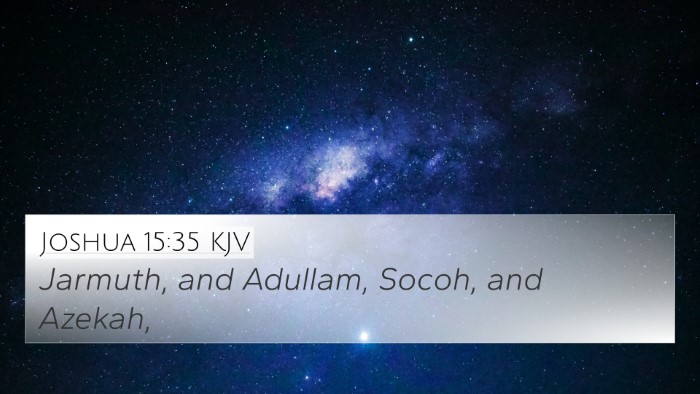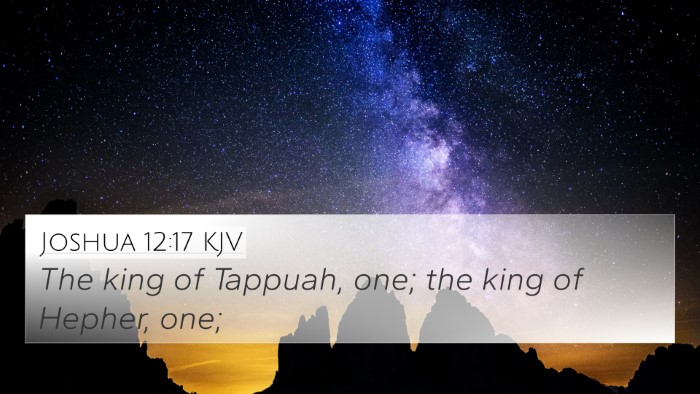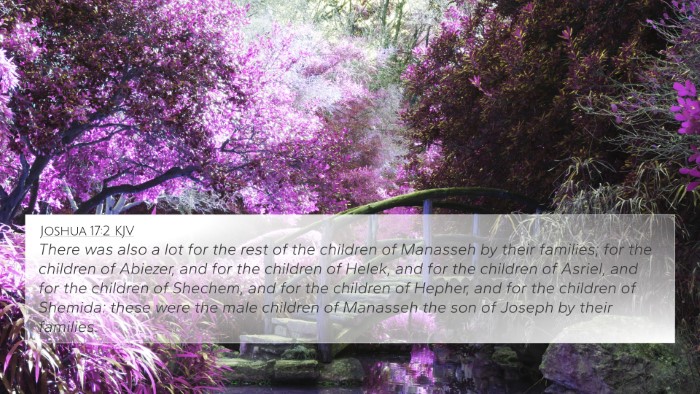Understanding 1 Kings 4:10
Verse: 1 Kings 4:10 (KJV) - "The son of Hesed, in Aruboth; to him pertained Socoh, and all the land of Hepher."
Summary of Meaning: This verse refers to one of King Solomon's officials and highlights the administrative organization of his reign. The mention of specific locations ties into the broader narrative of Solomon's governance and the territorial divisions established during this prosperous period. Public domain commentaries provide valuable insights into this verse, demonstrating how its context connects to larger theological themes.
Commentary Insights
-
Matthew Henry:
Henry emphasizes the good governance of Solomon and the efficient distribution of responsibilities. He interprets the names of officials and locations as part of God's providential order in establishing a kingdom. By appointing rulers over various regions, Solomon demonstrates wisdom and an understanding of the needs within his kingdom.
-
Albert Barnes:
Barnes discusses the geographical significance of Socoh and Hepher, indicating that they were strategic locations in the kingdom. He posits that Solomon's choice of officials reflects his ability to manage his vast empire effectively, ensuring both order and stability. This structure also points to the fulfillment of God’s promises about the abundance the Israelites would experience.
-
Adam Clarke:
Clarke takes a deeper look at the names mentioned, offering etymological insights and historical context. He suggests that Hepher, as a place, symbolizes the richness of the land under Solomon’s rule. Clarke’s approach reflects on the overarching narrative of Israel’s history leading to this peak of prosperity, linking it to divine favor and covenant fulfillment.
Cross-References
This verse can be connected to several others, providing deeper insight through cross-referencing Biblical texts:
- 2 Samuel 23:11-12: This passage references another warrior from the same region, illustrating the ongoing historical significance of Socoh.
- Joshua 15:35: Socoh is mentioned in the context of the land allocated to the tribes of Israel, emphasizing continuity throughout the biblical narrative.
- 1 Chronicles 5:16: This verse indicates the dwellings of certain tribes in Gilead and relates to Solomon’s governance structure.
- Proverbs 8:15-16: These verses recognize the role of wisdom in ruling, which ties back to Solomon’s reputation for wisdom.
- 1 Kings 3:5-14: The initial request for wisdom by Solomon introduces the theme of wisdom’s practical application in governance, preparing the ground for the administration of officials mentioned later.
- 1 Kings 10:1-2: The visit of the Queen of Sheba demonstrates the reach and wisdom of Solomon’s rule, reflecting the success of his administrative appointments.
- Deuteronomy 1:15: This verse informs about appointing leaders, highlighting the systematic management of resources and regions which Solomon continued.
Thematic Connections
Several themes arise from this verse that connects it with other scriptures:
- Divine Wisdom: The governance under Solomon’s reign exemplifies the application of divine wisdom (James 1:5).
- Covenant Fulfillment: The verses reflect the blessings promised to the Israelites (Deuteronomy 28:1-14).
- Territorial Integrity: The importance of land and inheritance in biblical covenants (Genesis 12:7; Exodus 3:8).
Using Cross-References for Deeper Study
Engaging with cross-references enriches the understanding of any biblical text. Tools for Bible cross-referencing can assist in:
- Finding similar themes and ideas across different scriptures.
- Enhancing sermon preparation through interconnected verses.
- Identifying historical contexts that inform the narrative at hand.
Conclusion
The verse in 1 Kings 4:10 serves as a reminder of the administrative excellence during Solomon's reign. It connects various themes in Scripture, providing insight into God’s overarching plan for His people. Utilizing cross-references reveals these connections, showcasing the richness of biblical study and the importance of understanding scripture in its broader context. This verse and its interpretations encourage a deeper exploration of how different parts of the Bible relate to one another.
